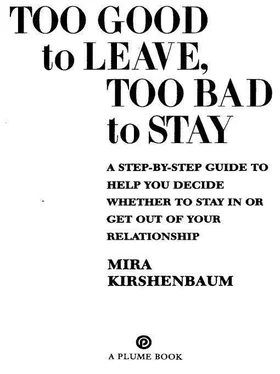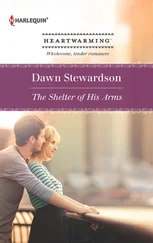Kirshenbaum, Mira - Too Good to Leave, Too Bad to Stay
Здесь есть возможность читать онлайн «Kirshenbaum, Mira - Too Good to Leave, Too Bad to Stay» весь текст электронной книги совершенно бесплатно (целиком полную версию без сокращений). В некоторых случаях можно слушать аудио, скачать через торрент в формате fb2 и присутствует краткое содержание. Жанр: Психология. Описание произведения, (предисловие) а так же отзывы посетителей доступны на портале библиотеки ЛибКат.
- Название:Too Good to Leave, Too Bad to Stay
- Автор:
- Жанр:
- Год:неизвестен
- ISBN:нет данных
- Рейтинг книги:3 / 5. Голосов: 1
-
Избранное:Добавить в избранное
- Отзывы:
-
Ваша оценка:
- 60
- 1
- 2
- 3
- 4
- 5
Too Good to Leave, Too Bad to Stay: краткое содержание, описание и аннотация
Предлагаем к чтению аннотацию, описание, краткое содержание или предисловие (зависит от того, что написал сам автор книги «Too Good to Leave, Too Bad to Stay»). Если вы не нашли необходимую информацию о книге — напишите в комментариях, мы постараемся отыскать её.
Too Good to Leave, Too Bad to Stay — читать онлайн бесплатно полную книгу (весь текст) целиком
Ниже представлен текст книги, разбитый по страницам. Система сохранения места последней прочитанной страницы, позволяет с удобством читать онлайн бесплатно книгу «Too Good to Leave, Too Bad to Stay», без необходимости каждый раз заново искать на чём Вы остановились. Поставьте закладку, и сможете в любой момент перейти на страницу, на которой закончили чтение.
Интервал:
Закладка:
Jennifer’s Answer. Soon after she came to see me, I asked Jennifer question #1. I was surprised by how quickly she said:
Oh no, it was never really very good. We’re just one of those good-on-paper couples. You know, we like the same things—books, music, movies—and we have similar opinions about things—politics, childrearing, spirituality. It wasn’t a match made in heaven, just computer heaven. We never really got pleasure from each other. We thought we were enjoying being together because we did things we both enjoyed. We’d go sailing and have a great time, but I’ve gone for walks with my dog where I feel Champ and I have gotten closer than Don and I ever have. But I blamed myself. I just had this sense that my heart had always been closed to him and that something would happen one day to make me open my heart and then my love would flow. But it’s been so many years and I wonder what I’m waiting for.
When she heard herself saying this, Jennifer was hit by a kind of emotional shock. It was suddenly clear to her. All this time she’d spent trying to figure out what to do with a relationship so filled with pros and cons—there’d never actually been a relationship in the first place. There’d been a marriage and a joint history and children and friends and possessions and the dream of a heart one day opening up. But never a relationship. She started crying for all the years she’d spent trying to make a decision about something that had never existed.
What if what’s true for Jennifer is true for you? The findings are very clear on this:
GUIDELINE # 1
If, when your relationship was at its “best,” things between you didn’t feel right or work well, the prognosis is poor. I feel comfortable saying that you’ll feel you’ve discovered what’s right for you if you choose to leave. Quick take: If it never was very good, it’ll never be very good.
If you fall into the ten percent of people in relationship ambivalence that guideline #1 applies to, I have to say to you what I say to everyone who answers no to question #1: it’s your decision, but most people in your situation who end up leaving are glad they did.
“How Can You Tell Me to Leave?”
If you think about it, this guideline’s not really such a leap. It’s not as if everything were perfect except for your answering no to this question. You’re in a state of relationship ambivalence right now! That means there are already plenty of negatives.
Beyond the fact that most people in your situation who leave are happy they did so, you’ve got to face the fact that if it was never very good at its best, then where are the good things going to come from that you have a right to look forward to in any relationship? You can wait, but it’s unlikely you’ll find them.
My years as a clinician plus a ton of accumulated research show that you can often fix what was broken, but you can rarely fix what never worked in the first place. There was a basic difficulty, present from the beginning, that prevented things from being good or prevented you from seeing that they weren’t good. The satisfaction-producing core that’s necessary for a relationship to take root was never there.
Professional integrity demands that I speak the truth as I see it. And the truth here is that a relationship that was never very good is unlikely to become good in the future. People can always surprise you, but in this case don’t hold your breath. If your answer to question #1 is clearly no, then you’ve already found the truth about whether it’s best for you to stay or leave.
Now let’s look at the flip side. I’m not saying you should resolve to commit to your relationship if things were good when they were at their best—there’s a lot more to consider before you do that. I am saying that people are generally satisfied when they choose to end their relationship if they realize that when things were at their “best” they weren’t, in fact, good.
PERSPECTIVES: WHAT’S LOVE GOT TO Do WITH IT?
All the questions here are designed to probe for whether your relationship is basically alive or dead.
Here’s an analogy. I’ve lived in a big old house in Boston for almost twenty years. When the real estate agent first showed it to me, students were living there and it was a mess. I took one look and said no way. Then for some reason I went back with a friend and she said, “Hang on a second, it just needs a cleaning and a clearing out of all this junk. Then it’ll be great.”
She was right. It turned out that with just some cleaning and paint the house was terrific.
That’s the way it is with a lot of relationships. There’s a surface of day-to-day experiences that might feel awful, but below the surface there’s what I call a satisfaction-producing core. It’s there as solidly and clearly as a sturdy well-built house might be there underneath some dirt and clutter. What makes a relationship actually too good to leave is when it has that satisfaction-producing core.
Now let’s look at the other alternative. We’ve all known houses that look good on the outside, but there’s structural damage due to a poorly laid foundation or major termite infestation or water damage or many other problems. These are houses that need a lot more than most of us are willing or able to put into them. They might look good, but they’re really not worth the trouble. They will begin as a headache and end as a heartache.
It’s that way with a lot of relationships. Any couples therapist will tell you about relationships where the surface might be nice and smooth and polite, even seemingly friendly, but below the surface there’s what I call a basic discord. I’m talking about an emotional, psychological fracture or dislocation or disconnection. There’s something rotten in the foundation, regardless of what the surface is like, and the only thing it’s built for is distance and hostility. What makes a relationship actually too bad to stay in is when it has that basic discord.
The Truth of Love and the Love of Truth
How does love fit into all this? We’ll talk about love plenty in this book. But for now let’s remember what our job is here: to put love in perspective. Love is a mystery we have to respect. But I know this (and I hope you agree with me): if love has any function it’s as our servant, not our master. Love is an important part of our lives, but we’re not love’s slaves. Most of all we’re not love’s fools.
To see the importance of putting love into perspective, just think about situations we’ve all known about personally and that I’ve certainly seen my share of as a therapist. I’m talking about those cases where some man or woman is horribly abused or neglected or maltreated and yet stays in the relationship. Why? “I can’t help it,” they say. “I love him [or her].” And we’ve all seen cases where it seems as though someone is in a perfectly good relationship with a thoroughly nice person and yet walks out. Why? “I couldn’t help it. I just stopped loving him [or her].”
Love can too easily be the wild card in our relationships, taking on any value at any time for any reason. If we don’t put it into perspective, it will make fools of us.
But it’s time we told the truth about love. Love isn’t blind and it isn’t stupid. It can see and it can learn. If you allow your love to see the truth of your relationship, if you allow your love to take care of you, it’ll respond appropriately.
Do you really want to open your heart to a love that will not let you show it the truth of your life? If the truth is that there’s a basic discord in your relationship, that it’s dead and will never work, what good is a love that refuses to see this?
Читать дальшеИнтервал:
Закладка:
Похожие книги на «Too Good to Leave, Too Bad to Stay»
Представляем Вашему вниманию похожие книги на «Too Good to Leave, Too Bad to Stay» списком для выбора. Мы отобрали схожую по названию и смыслу литературу в надежде предоставить читателям больше вариантов отыскать новые, интересные, ещё непрочитанные произведения.
Обсуждение, отзывы о книге «Too Good to Leave, Too Bad to Stay» и просто собственные мнения читателей. Оставьте ваши комментарии, напишите, что Вы думаете о произведении, его смысле или главных героях. Укажите что конкретно понравилось, а что нет, и почему Вы так считаете.












